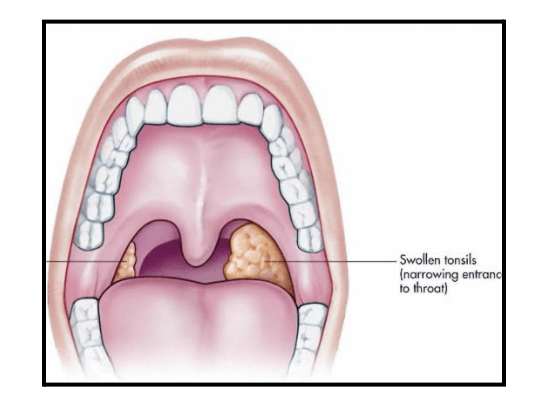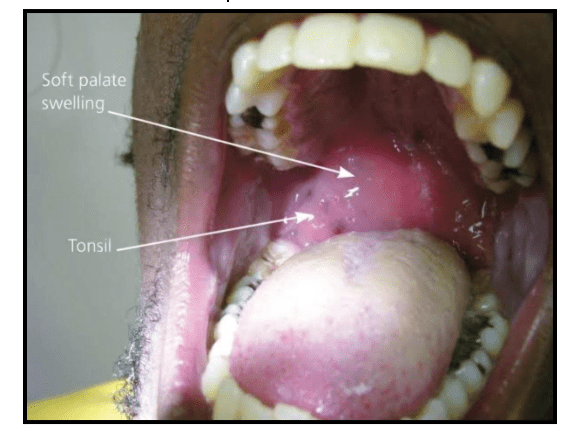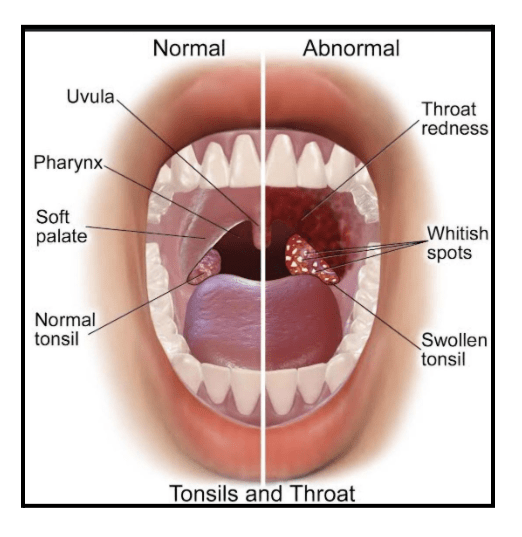What is Tonsillitis?
Tonsillitis-Treatment, symptoms & causes are commonly searched topics related to this condition. Tonsillitis is a common medical condition wherein the tonsillar glands get enlarged and infected. Tonsils are the lumps of soft tissue you see at the sides of the throat. These are functionally lymph glands involved in immunological functions to protect our body. However, with certain bacterial or viral infections, the tonsils may also get infected, enlarged, and cause pain.
What are the causes of tonsillar enlargement?
-
Infections (Bacterial or Viral)
-
Chronic inflammatory response (Tonsillolith, Tonsillar cyst)
-
GERD, chronic peptic ulcer disease
-
Certain neoplasms like lymphoma, leukemia, etc. (rare cases)
What are the symptoms of tonsillitis?
-
Soreness of the throat
-
Pain or difficulty swallowing
-
Congested throat, congested tonsils
-
Whitish spots or whitish membrane over the tonsil
-
Pyrexia (high-grade fever)
-
Lymph nodes palpable in the neck
-
Vomiting
-
Tonsillar enlargement can hinder speech and may present with recurrent cold
What are the affected age groups?
While tonsillitis-treatment, symptoms & causes are often associated with children, this condition can affect all age groups. Adults can also present with some or all of these symptoms.

What are the Complications of Untreated Tonsil Infection?
Ignoring tonsillitis-treatment, symptoms & causes can lead to severe complications. Tonsillitis, if left untreated, may present as:
-
Peritonsillar Abscess – A painful, unilateral enlarged tonsil with a change in voice, congested tonsils, and uvula pushed to the opposite side. Swollen neck nodes may also be present.
-
Tonsillolith – Whitish spots or palpable hard stones over the tonsils, usually due to hardened debris or food particles, which are difficult to remove.
-
Tonsillar Cyst – A sterile fluid collection, usually trapped mucus, which may cause difficulty swallowing and sometimes earache.
-
Evolving Abscess – When an untreated tonsil infection spreads, it can lead to serious conditions like a parapharyngeal abscess, where the infected fluid spreads into the neck spaces.
Serious Complications of Prolonged Untreated Bacterial Tonsillitis:
-
Post-Streptococcal Septic Arthritis – Joint swelling due to a bacterial strain that affects the joints.
-
Rheumatic Fever – An inflammatory disease caused by partially or inadequately treated streptococcal throat infection.
-
Otitis Media – The infection may spread to the middle ear, leading to a painful middle ear infection.
Management Protocol for Tonsillitis
Always visit a clinician when you have a sore throat or enlarged tonsils. Self-medication is only advisable for mild cases. If pain persists or tonsils are significantly swollen, consult a doctor.
Medical Treatments
-
Antibiotics – Prescribed if the infection is bacterial. Completing the full course is crucial to prevent the infection from spreading.
-
Pain Killers – Over-the-counter medications can relieve pain and help control inflammation.
-
Betadine Gargles – Medicated gargles help soothe the throat by washing away debris and pus.
Home Remedies for Tonsillitis
-
Stay hydrated with plenty of warm liquids and bland soups.
-
Gargle with lukewarm water mixed with a teaspoon of salt.
-
Use OTC medications for mild fever/infection, but always seek a clinician’s advice for persistent symptoms.
For expert care and effective tonsillitis-treatment, symptoms & causes, consult a healthcare professional.

Will I Need a Tonsillectomy Surgery?
The need for tonsillitis-treatment, symptoms & causes depends on the frequency and severity of your tonsil infections. Your doctor will assess if:
-
You have Grade 2 or higher tonsils.
-
You experience frequent sore throat, recurrent colds, cough, or difficulty swallowing.
-
Your tonsils are severely enlarged or suspected to be linked to an underlying tumor.
If any of these conditions apply, your doctor may recommend Tonsillectomy Surgery, a common tonsillitis treatment for long-term relief.
What is Tonsillectomy Surgery?
Tonsillectomy is a surgical procedure in which the tonsils are completely removed, ensuring no chance of regrowth. This is a key part of tonsillitis treatment when the infection becomes recurrent or severe. The procedure is performed under general anesthesia and may require a short hospital stay depending on recovery.
Is Tonsillectomy Surgery Painful?
Post-surgery, mild throat discomfort is expected for a few days but is well-managed with medications. With frequent swallowing, proper post-operative hygiene, and care, most patients can resume normal activities within a few days.
Will Tonsillitis Go Away on Its Own?
-
Mild infections may subside within a week with proper medication and home care.
-
However, chronically enlarged tonsils do not shrink completely and may need surgical removal as part of tonsillitis treatment.
When Does Tonsillitis Become an Emergency?
Seek urgent medical attention if you experience:
-
High fever that doesn’t subside.
-
Severe sore throat lasting more than a week.
-
Extremely painful swallowing.
-
Difficulty in breathing due to enlarged tonsils.
Understanding tonsillitis-treatment, symptoms & causes is crucial to managing this condition effectively. For expert Tonsillectomy Surgery and comprehensive care, consult a healthcare professional today.

At Richardson’s Hospital
Here we have the expert Panel of ENT Surgeons to treat you and we have the state of art OT facility and an diligent ICU and In-patient care and services ensuring you get the best ,timely and the holistic care that you need .
